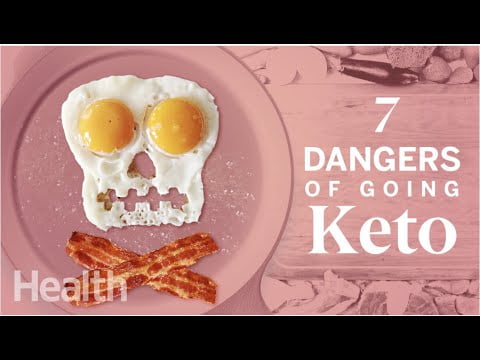The keto diet has become increasingly popular in recent years, and while it can provide many health benefits, there are also some potential risks associated with it. In this post, we will explore seven potential dangers of the keto diet that everyone should know about before starting this type of meal plan.
- Nutrient Deficiencies: While following a ketogenic diet, you may not be getting enough of certain vitamins and minerals. This is since many high-carbohydrate foods such as fruits and legumes that are rich sources of key micronutrients are eliminated from the diet. As such, it is important to supplement with a multivitamin or other dietary supplements to ensure you are getting all of your essential vitamins and minerals.
- Digestive Issues: Going low-carb for an extended period can cause digestive issues such as constipation and diarrhea as your body adjusts to the new way of eating. To help minimize these issues, make sure to drink plenty of water (at least eight glasses per day) and eat high-fiber foods like leafy greens and nuts to help move things along more smoothly. Probiotics can also be helpful if needed.
- Heart Disease Risk Factors: Going low-carb for an extended period can raise levels of LDL cholesterol (the “bad” kind) in some people which can lead to an increased risk of heart disease over time. It is important to have your cholesterol checked regularly while following a ketogenic eating plan to make sure you do not fall into this category. Additionally, include healthy fats such as olive oil or avocado oil when cooking instead of saturated fats like butter or lard as much as possible – these are better choices when it comes to maintaining overall heart health.
- Short Term Side Effects: Common initial side effects on the keto diet include headaches, nausea, fatigue, difficulty sleeping and bad breath (known colloquially as “keto breath”). These symptoms may arise due to dehydration from not drinking enough fluids or from the body adjusting to its new fuel source (fat). Consuming mineral-rich electrolytes such as magnesium chloride or sodium bicarbonate may help relieve any ill effects that come up during the adjustment phase if necessary.
- Long Term Health Risks: Although short term studies have shown some encouraging results when it comes to following a keto diet for weight loss or metabolic health improvement, there aren’t currently any long term studies that show what long term consequences there could be for following a very low-carb lifestyle for an extended period – so caution should be taken before making drastic changes without consulting with your doctor beforehand.
- Hypoglycemia Risk: Reducing carbohydrate intake dramatically puts you at risk for hypoglycemia; severe episodes lasting longer than four hours should be treated immediately by having glucose tablets or candy handy at all times in case symptoms arise suddenly.
- Reduced Athletic Performance: Athletes who follow a strict ketogenic regimen sometimes report lower energy levels during workouts due to their bodies being deprived of carbohydrates; ensuring adequate hydration is essential irrespective if you are exercising recreationally or competitively in order stay performant at all times while remaining safe from overexertion due medical difficulties caused by electrolyte imbalances which can occur during these events as well!
In conclusion, although there are many potential benefits associated with following a low-carbohydrate meal plan such as the ketogenic diet, it is important to remember that there are also some potential risks involved – so proceed with caution if considering this type of dietary approach! Ensure proper supplementation and regular checkups with your physician throughout the process in order optimize your results without compromising safety!





